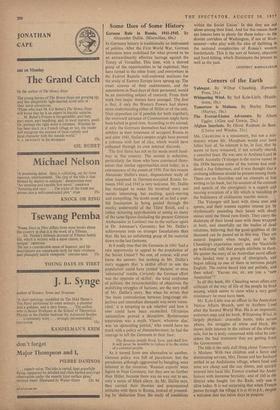Some Uses of Some History
German Rule in Russia, 1941-1945. By Alexander Dallin. (Macmillan, 60s.)
IN Germany history is traditionally an instrument of politics. After the First World War, German historians were mobilised for what proved to be an extraordinarily effective barrage against the Treaty of Versailles. This time, with a shrewd grasp of the opportunities to be exploited, they have turned to the other front; and everywhere in the Federal Repulic well-endowed institutes for the study of Eastern Europe have sprung up. The exact sources of their endowments, and the antecedents in Nazi days of their personnel, would be an interesting subject of research. From their work two major themes have emerged. The first is that, if only the Western Powers had shown more understanding either of Hitler or of the anti- Nazi opposition (or if possible for both together), the westward advance of Communism might have been halted in good time. According to the second, if only the Germans themselves had shown more subtlety in their treatment of occupied Russia in and after 1941, Stalin's empire might have proved a colossus with feet of clay, which would have collapsed through its own internal discords.
The first thesis has not so far made much head- way in this country. The second is seductive, particularly for those who have convinced them- selves that similar opportunities exist today, as a consequence of the events of 1956. For this reason Alexander Dallin's exact, dispassionate study of what happened in German-occupied Russia be- tween 1941 and 1945 is very welcome. Mr. Dallin has managed to make his involved story not merely interesting, but exciting, quick-moving and compelling. No doubt most of us feel a mor- bid fascination in being guided through the murky underworld of the Third Reich, and a rather sickening apprehension at seeing so many of the same figures (including the present German Ambassador in London) rise to the surface again in Dr. Adenauer's Germany; but Mr. Dallin's achievement rests on stronger foundations than that. He has an unfaltering grasp of his material down to the last footnote.
Is it really true that the Germans in 1941 'had a rare opportunity to appeal to the population of the Soviet Union'? No one, of course, will ever know the answer; but nothing in Mr. Dallin's story suggests that 'a skilful effort to win the population' could have yielded 'decisive' or even `substantial' results. Certainly the German effort was the opposite of skilful : the total confusion of policies; the irreconcilability of objectives, the stultifying struggles of factions, are the very stuff of Mr. Dallin's story. But when he writes that 'the basic contradiction between long-range ob- jectives and immediate demands was never recon- ciled,' it is tempting to ask whether and how it ever could have been reconciled. Ukrainian. nationalism proved a deception; Byelorussian separatism was a myth. Vlasov, whatever else, was `an upstanding patriot,' who would have no truck with a policy of dismemberment; he had the courage to tell the Germans to their face : The Russian people lived, lives, and shall live. It will never be possible to reduce it to the status of a colonial people.
As it turned from one alternative to another, German policy was full of paradoxes; but the paradoxes, although aggravated by bungling, were inherent in the situation. 'Russian experts' were legion in Nazi Germany; but they saw no further than Hitler, because there was no way out to see, only a series of blind alleys. As Mr. Dallin says, they carried their theories and preconceived attitudes with them to Russia, instead of proceed- ing by 'deduction from the study of conditions within the Soviet Union.' In this they are not alone among their kind. And for this reason there are lessons here in plenty for those today—in the dustier corridors of Washington, if not of West- minster—who play with the idea of dabbling in the national complexities of Russia's western borderlands. This is the sort of history, objective and hard-hitting, which illuminates the present as well as the past.
GEOFFREY BARRACLOUGH






























 Previous page
Previous page